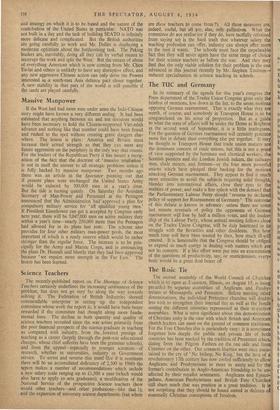Science Teachers
The recently-published report on The Shortage of Science- Teachers certainly underlines the increasing seriousness of the problem, but does not go very far along the way towards solving it. The Federation of British Industries showed commendable enterprise in setting up the independent committee whose work the report is; it would have been better rewarded if the committee had thought along more funda- mental lines. The decline in both quantity and quality of science teachers recruited since the war arises primarily from the poor financial prospects of the science graduate in teaching as compared with industry, from the lowered prestige of teaching as a career (largely through the post-war educational changes, whose chief sufferers have been the grammar schools), and from the appeal—especially to younger scientists—of research, whether in universities, industry or Government service. To arrest and reverse this trend (for if it continues there will be an accumulated deficiency of 2,300 in 1960) the report makes a number of recommendations which include a new salary scale ranging up to £1,500 a year (which would also have to apply to arts graduates); a modification of the National Service of the prospective Science teachers (how would other teachers—and other professions—like that ?); and the expansion of university science departments (but where are these teachers to come from ?).• All these measures are,- indeed, useful, but all are, alas, only palliatives. What the committee do not realise (or if they do, have tactfully refrained from saying so) is the hard truth that whatever salary the teaching profession can offer, industry can always offer more to the men it wants. The schools must face the unpalatable fact that they will never again have the same range of choice for their science teachers as before the war. And they may find that the only viable solution for their problem is the one advanced in this journal recently by Mr. Stephen Toulmin—. reduced specialisation in science teaching in schools.


































 Previous page
Previous page